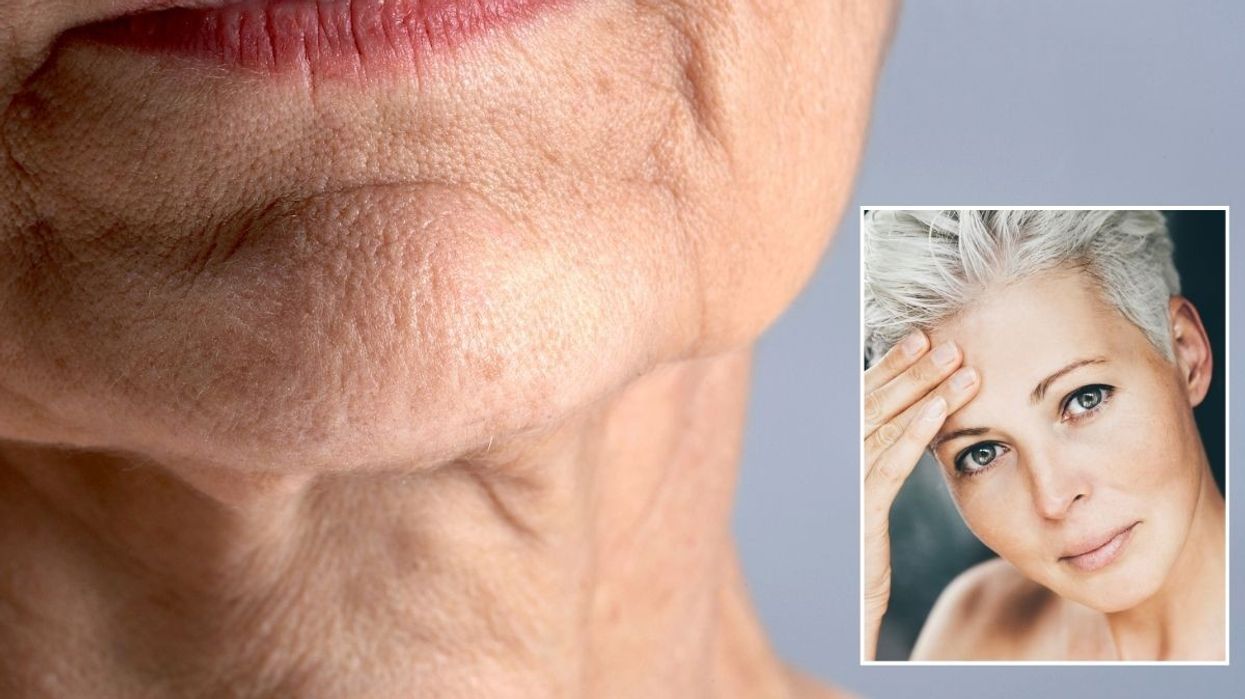How to improve sagging skin: Plastic surgeon shares how to make your face firmer without going under the knife

Women have been told how to keep the skin on their faces tight and taut
|GETTY IMAGES

GB News is speaking to experts about the best measures to achieve beauty goals. This week, a facial plastic surgeon weighed in on the skin care, diet, hydration and lifestyle strategies that work wonders
Don't Miss
Most Read
Sagging skin is a product of genetic factors, environmental factors and the inevitable process of ageing, as we face a reduction in collagen production, elasticity and hydration.
But while it is something that befalls all of us at some point or other, there are some very easy strategies we can implement to improve this.
GB News spoke exclusively to facial plastic surgeon Dr Joel Kopelman about how to improve sagging skin - it's possible to do it without going under the knife.
According to the expert, it's all about making the right choices when it comes to skin care, diet, hydration and lifestyle.

Sunscreen is essential for protecting against UV damage
|GETTY IMAGES
Skin care
The plastic surgeon advised opting for products that are rich in antioxidants, peptides and retinoids to help stimulate collagen production, "which is crucial for maintaining skin firmness". He also recommended looking for ingredients such as vitamin C, hyaluronic acid and niacinamide.
Unsurprisingly, the expert stressed the importance of using sunscreen. It is "essential" for protecting against UV damage, "which accelerates skin ageing and sagging."
Facial yoga and exercises
As well as practising a good skin care regime, facial yoga can work wonders to "strengthen the underlying muscles and improve circulation, which can help to lift and firm the skin over time".
The expert advised: "Regularly performing exercises that target the jawline, cheeks, and forehead can contribute to a more toned appearance."
Diet and hydration
It's also possible to eat your way to beautifully firm skin. The expert said: "Your diet plays a significant role in skin health."
He advised piling your plate high with foods that are rich in "collagen-boosting nutrients" like vitamin C, omega-3 fatty acids and amino acids, explaining that these can help maintain skin elasticity.
Good sources of vitamin C include citrus fruit, such as oranges and orange juice, peppers, strawberries, blackcurrants, broccoli, Brussels sprouts and potatoes.
For omega-3 fatty acids, women should ensure they are consuming plenty of fish and other seafood (especially cold-water fatty fish, such as salmon, mackerel, tuna, herring, and sardines), nuts and seeds, plant oils and fortified foods, such as certain brands of eggs, yoghurt, juices, milk and soy beverages.
The best sources of amino acids are found in animal proteins such as beef, poultry and eggs. For vegetarians and vegans, nuts, seeds, beans and some grains contain some but not all of the essential amino acids.
Women should also ensure they are staying hydrated, as this helps to maintain their skin's plumpness.
Lifestyle habits
An effective skin care regime, facial yoga and healthy diet are all good and well. However, women who want firm, non-saggy skin must also pay attention to their lifestyle habits.
The plastic surgeon told ladies that avoiding smoking and excessive alcohol consumption is "vital", as these bad habits can break down collagen and elastin, leading to sagging skin.
He also recommended getting enough sleep so that the skin can "repair and regenerate".
Stress management
The plastic surgeon warned: "Chronic stress can lead to increased cortisol levels, which can break down collagen."
To combat chronic stress, he advised women to incorporate activities into their lives like meditation, yoga and deep breathing exercises.
Dermatologist Dr Divya Sachdev also weighed in on how women can combat sagging skin, speaking exclusively to GB News about at-home solutions.
The expert advised: "As we age we lose collagen, which causes us to get saggy skin.
"We can help increase our collagen by eating a diet high in protein and vegetables and avoiding sugar. We can also use skin care ingredients like vitamin C and retinol to help build collagen."
LATEST DEVELOPMENTS

Make sure you're consuming foods that are rich in 'collagen-boosting nutrients' like vitamin C
| PA IMAGESLike Dr Joel Kopelman, the dermatologist also recommended wearing sunscreen to help prevent photodamage (the damage the sun does to the skin).
He concluded: "Stress is also a big proponent of ageing so it's important to meditate and calm our stress to help combat ageing."
Nina Bal Facial Sculpting advises that there are certain "lifestyle hacks" you can implement to "tighten skin through prevention and maintain those youthful contours for longer".
The expert advised doing movements and exercises that build muscle mass or tighten muscles.
Weight lifting, resistance training, pilates and facial exercises can "strengthen different parts of the body and reduce saggy skin".
Women can also take supplements, such as hyaluronic acid and collagen to reduce "age-related sagging skin". Nina Bal recommends LYMA.
Topical treatments can also be extremely helpful and women should look for products that contain retinol and hyaluronic acid.
The expert said: "Retinol is part of a family of derivates from vitamin A called retinoids, commonly found in anti-ageing products, which is clinically proven to boost collagen and elastin production."
Lifestyle changes such as managing your weight, getting regular massages and avoiding smoking are also beneficial, as is avoiding tanning and too much exposure to UV/UVA rays.
Top tips for improving sagging skin
- Be diligent with your sunscreen
- Look for ingredients like antioxidants, peptides, retinoids, vitamin C, hyaluronic acid and niacinamide in skin care products
- Practise facial yoga
- Eat foods rich in vitamin C, omega-3 fatty acids and amino acids
- Stay hydrated
- Get enough sleep
- Avoid smoking and excessive alcohol consumption
- Manage stress levels
- Supplements










